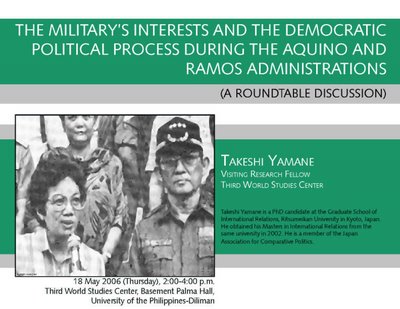
The Military's Interests and the Democratic Political Process during the Aquino and Ramos Administrations: Institutions, Actors, and the Threat Environment (A Roundtable Discussion)
Takeshi Yamane
Visiting Research Fellow
Third World Studies Center]
18 May 2006 (Thursday)
2:00-4:00 p.m.
Third World Studies Center
Basement Palma Hall
University of the Philippines-Diliman
ABSTRACT
Right after the transition from Marcos regime to Aquino administration, the Armed Forces of the Philippines (AFP) had intensified its political intervention. The AFP viewed that the new administration’s policies were against its corporate interests. Some soldiers staged several coups to overthrow the government and to establish a military-dominated regime, while others tried to promote AFP’s interests by pressuring the President and exploiting the instability created by the coups. In doing so, they won some measures which they wanted. Thus, in the beginning of the Aquino administration, direct actions to or pressures on the President were measures of the AFP to promote its interests and to wield influences over the politics. On the other hand, realization of some of the AFP’s interests due to Aquino’s policy change, ascendancy of officers like Fidel Ramos who deny the coups, progressing democratic consolidation such as establishment of the Constitution, convocation of the Congress and emerging public opinion against military coups, all started influencing the relations between the AFP and politics. The convocation of the Congress and resurrection of democratic procedure had a significant impact on the mode of the AFP’s influence over the political process because, in many cases, the legislation in Congress had become necessary in meeting the AFP’s interests. Now the question arises: how have the resurrection of democratic procedure shaped the nature of the relation between military and politics? In this presentation, mainly focusing on the tripartite relation of President, Congress and AFP and observing some cases, how the AFP’s corporate interests were treated and materialized or not materialized in political process during the Aquino and Ramos administrations is examined, revealing; 1) the behaviors and behavioral tendencies of those actors in respect of the AFP’s interests, 2) the manners of political involvement of the AFP, 3) factors which affect these processes and results.
________________________________________________________
Takeshi Yamane is a PhD candidate at the Graduate School of International Relations, Ritsumeikan University in Kyoto, Japan. He obtained his Masters in International Relations from the same university in 2002. He is a member of the Japan Association for Comparative Politics.
Wednesday, May 17, 2006
The Military's Interests and the Democratic Political Process during the Aquino and Ramos Administrations (A Roundtable Discussion)
Posted by
UP Third World Studies Center
at
11:15 AM
![]()
Subscribe to:
Post Comments (Atom)


No comments:
Post a Comment